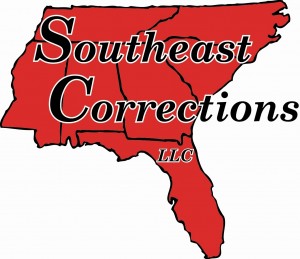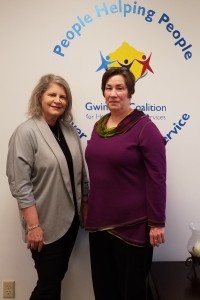Southeast Corrections, LLC
Gwinnett Coalition for Health and Human Services
Sixty-eight callers daily. 2,083 each month. A total of 25,000 per year. These numbers represent people; people in need who are finding hope and help with the assistance of the Gwinnett Coalition for Health and Human Services.
Ellen Gerstein, Executive Director of the Gwinnett Coalition for Health and Human Services and Suzy Bus, Helpline Director, hosted staff from Southeast Corrections on January 31, 2017 for an informational session on the activities of the Coalition and the ongoing participation of community service work labor as a part of their daily operation.
The Coalition was created as a non-profit agency in 1991 and Ellen was hired to establish an information and referral source for Gwinnett County to direct persons seeking emergency services to one of the over 1,000 agencies providing services within Gwinnett County. Additionally, the Coalition instituted a needs assessment instrument that has been used to create five, five-year strategic plans to identify a hierarchy of critical needs and how to best meet them for Gwinnett’s citizens.
Ellen Gerstein and Suzy Bus
Suzy Bus works closely with Southeast Corrections staff related to community service workers who are completing court-ordered community service work through staffing the Help Line on either four or eight-hour shifts. Community service workers at the Help Line are required to complete an eight-hour training course on how to interact over the phone with persons who call the Help Line, understand how to ascertain what resources are available to help their situation, and how to troubleshoot when questions arise that the community service worker is not prepared to answer.
Community service workers assigned to the Helpline learn a number of beneficial skills that carry over after their required community service work is completed; accurate completion of paperwork, interpersonal communication skills, working in a team environment, problem-solving, and being on time and prepared for their shift are just a few of the skills that probationers can acquire. Suzy explained that beyond the measurable work skills, community service workers are confronted with situations on an emotional level while helping clients that often lead them to reassess their own situations and realize that there are always people in situations far worse than your own. On many occasions, community service workers have shared with Suzy how their work at the Helpline was an eye-opening experience at how they have the ability to make a real difference in the lives of others. “That’s my shot in the arm that keeps me going”, Suzy said.
Ellen takes the win-win description a step further when she describes the use of community service workers in her organization as a win-win-win. She described the relationship with community service workers as a win for the organization, the community service worker, and the callers and community who are helped through the process.
Ellen will be attending a professional conference in Washington D.C. later this year where a part of her presentation will focus on how the use of court-ordered community service labor can bring new benefits and efficiencies to agencies like the Coalition across the country.
Ellen left Southeast Corrections with a challenge to become involved with the Gwinnett Great Days of Service in 2017. It is our goal to focus community service workers to this worthy project and make opportunities available for staff to participate in a local project during regular work hours. In 2015, 339,000 hours of volunteer work performed by over 97,000 volunteers created a local economic benefit of over $7.6 million. Over 65 agencies and 112 public schools benefited from local, targeted projects.
Southeast Corrections is grateful for the opportunity to support the Coalition and all of the agencies working diligently for the betterment of Gwinnett County. Our agencies intersect at the desire to see everyone who enters our programs find their lives improved in some way when their time with us is completed. Suzy shared that it is not uncommon for community service workers to continue to volunteer beyond their court-ordered requirements. That speaks volumes about the impact this organization is making on the persons in the community with great needs and those who are there to serve them.


